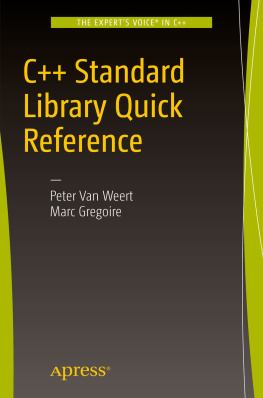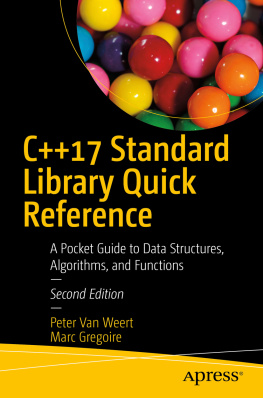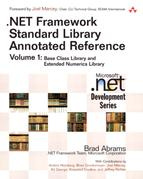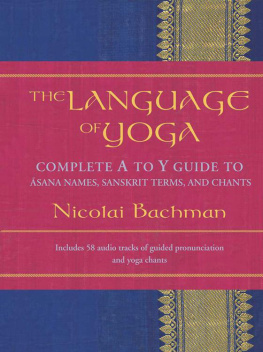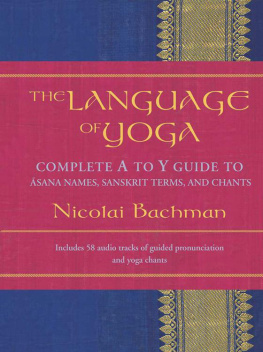Nicolai M. Josuttis - The C++ Standard Library: A Tutorial and Reference
Here you can read online Nicolai M. Josuttis - The C++ Standard Library: A Tutorial and Reference full text of the book (entire story) in english for free. Download pdf and epub, get meaning, cover and reviews about this ebook. year: 2012, publisher: Addison-Wesley, genre: Computer. Description of the work, (preface) as well as reviews are available. Best literature library LitArk.com created for fans of good reading and offers a wide selection of genres:
Romance novel
Science fiction
Adventure
Detective
Science
History
Home and family
Prose
Art
Politics
Computer
Non-fiction
Religion
Business
Children
Humor
Choose a favorite category and find really read worthwhile books. Enjoy immersion in the world of imagination, feel the emotions of the characters or learn something new for yourself, make an fascinating discovery.

- Book:The C++ Standard Library: A Tutorial and Reference
- Author:
- Publisher:Addison-Wesley
- Genre:
- Year:2012
- Rating:4 / 5
- Favourites:Add to favourites
- Your mark:
- 80
- 1
- 2
- 3
- 4
- 5
The C++ Standard Library: A Tutorial and Reference: summary, description and annotation
We offer to read an annotation, description, summary or preface (depends on what the author of the book "The C++ Standard Library: A Tutorial and Reference" wrote himself). If you haven't found the necessary information about the book — write in the comments, we will try to find it.
The C++ Standard Library: A Tutorial and Reference — read online for free the complete book (whole text) full work
Below is the text of the book, divided by pages. System saving the place of the last page read, allows you to conveniently read the book "The C++ Standard Library: A Tutorial and Reference" online for free, without having to search again every time where you left off. Put a bookmark, and you can go to the page where you finished reading at any time.
Font size:
Interval:
Bookmark:
A Tutorial and Reference
Second Edition
Nicolai M. Josuttis

Upper Saddle River, NJ Boston Indianapolis San Francisco
New York Toronto Montreal London Munich Paris Madrid
Capetown Sydney Tokyo Singapore Mexico City
Nicolai M. Josuttis
A Tutorial and Reference
Second Edition
Supplementary Chapter
Print book ISBN-13: 978-0-321-62321-8
Print book ISBN-10: 0-321-62321-5
Copyright 2012 Pearson Education, Inc.
All rights reserved.
Many of the designations used by manufacturers and sellers to distinguish their products are claimed as trademarks. Where those designations appear in this book, and the publisher was aware of a trademark claim, the designations have been printed with initial capital letters or in all capitals.
The author and publisher have taken care in the preparation of this book, but make no expressed or implied warranty of any kind and assume no responsibility for errors or omissions. No liability is assumed for incidental or consequential damages in connection with or arising out of the use of the information or programs contained herein.
The publisher offers excellent discounts on this book when ordered in quantity for bulk purchases or special sales, which may include electronic versions and/or custom covers and content particular to your business, training goals, marketing focus, and branding interests. For more information, please contact:
U.S. Corporate and Government Sales
(800) 382-3419
For sales outside the United States, please contact:
International Sales
Visit us on the Web: informit.com/aw
Library of Congress Cataloging-in-Publication Data
Josuttis, Nicolai M.
The C++ standard library : a tutorial and reference / Nicolai M. Josuttis.2nd ed.
p. cm.
Includes bibliographical references and index.
ISBN 978-0-321-62321-8 (hardcover : alk. paper)
1. C++ (Computer program language) I. Title.
QA76.73.C153J69 2012
005.133-dc23
2011045071
Copyright 2012 Pearson Education, Inc.
This book was typeset by the author using the LATEX document processing system.
All rights reserved. Printed in the United States of America. This publication is protected by copyright, and permission must be obtained from the publisher prior to any prohibited reproduction, storage in a retrieval system, or transmission in any form or by any means, electronic, mechanical, photocopying, recording, or likewise. To obtain permission to use material from this work, please submit a written request to Pearson Education, Inc., Permissions Department, One Lake Street, Upper Saddle River, New Jersey 07458, or you may fax your request to (201) 236-3290.
ISBN-13: 978-0-321-62321-8
ISBN-10: 0-321-62321-5
Text printed in the United States on recycled paper at Edwards Brothers in Ann Arbor, Michigan. First printing, March 2012
To those who care
for people and mankind
This Supplementary Chapter provides additional material that could not be included in The C++ Standard Library, Second Edition, due to its size.
I never thought that the first edition of this book would sell so long. But now, after twelve years, its time for a new edition that covers C++11, the new C++ standard.
Note that this means more than simply adding new libraries. C++ has changed. Almost all typical applications of parts of the library look a bit different now. This is not the result of a huge language change. Its the result of many minor changes, such as using rvalue references and move semantics, range-based for loops, auto, and new template features. Thus, besides presenting new libraries and supplementary features of existing libraries, almost all of the examples in this book were rewritten at least partially. Nevertheless, to support programmers who still use old C++ environments, this book will describe differences between C++ versions whenever they appear.
I learned C++11 the hard way. Because I didnt follow the standardization as it was happening I started to look at C++11 about two years ago. I really had trouble understanding it. But the people on the standardization committee helped me to describe and present the new features as they are intended to be used now.
Note, finally, that this book now has a problem: Although the books size grew from about 800 to more than 1,100 pages, I still cant present the C++ standard library as a whole. The library part of the new C++11 standard alone now has about 750 pages, written in very condensed form without much explanation. For this reason, I had to decide which features to describe and in how much detail. Again, many people in the C++ community helped me to make this decision. The intent was to concentrate on what the average application programmer needs. For some missing parts, I provide a supplementary chapter on the Web site of this book, http://www.cppstdlib.com, but you still will find details not mentioned here in the standard.
The art of teaching is not the art of presenting everything. Its the art of separating the wheat from the chaff so that you get the most out of it. May the exercise succeed.
This book presents ideas, concepts, solutions, and examples from many sources. Over the past several years, the C++ community introduced many ideas, concepts, proposals, and enhancements to C++ that became part of C++11. Thus, again Id like to thank all the people who helped and supported me while preparing this new edition.
First, Id like to thank everyone in the C++ community and on the C++ standardization committee. Besides all the work to add new language and library features, they had a hard time explaining everything to me, but they did so with patience and enthusiasm.
Scott Meyers and Anthony Williams allowed me to use their teaching material and book manuscripts so that I could find many useful examples not yet publicly available.
Id also like to thank everyone who reviewed this book and gave valuable feedback and clarifications: Dave Abrahams, Alberto Ganesh Barbati, Pete Becker, Thomas Becker, Hans Boehm, Walter E. Brown, Paolo Carlini, Lawrence Crowl, Beman Dawes, Doug Gregor, David Grigsby, Pablo Halpern, Howard Hinnant, John Lakos, Bronek Kozicki, Dietmar Khl, Daniel Krgler, Mat Marcus, Jens Maurer, Alisdair Meredith, Bartosz Milewski, P. J. Plauger, Tobias Schle, Peter Sommerlad, Jonathan Wakely, and Anthony Williams.
There is one person who did an especially outstanding job. Whenever I had a question, Daniel Krgler answered almost immediately with incredible accurateness and knowledge. Everyone in the standardization process know that he treats everybody this way. Without him, both the C++ standard and this book would not have the quality they have now.
Many thanks to my editor Peter Gordon, Kim Boedigheimer, John Fuller, and Anna Popick from Addison-Wesley. Besides their support, they found the right balance between patience and pressure. The copy editor Evelyn Pyle and the proofreader Diane Freed did an incredible job translating my German English into American English. In addition, thanks to Frank Mittelbach for solving my LATEX issues.
Last but not least, all my thanks go to Jutta Eckstein. Jutta has the wonderful ability to force and support people in their ideals, ideas, and goals. While most people experience this only when working with her, I have the honor to benefit in my day-to-day life.
In the beginning, I only planned to write a small German book (400 pages or so) about the C++ standard library. That was in 1993. Now, in 1999 you see the result a book in English with more than 800 pages of facts, figures, and examples. My goal is to describe the C++ standard library so that all (or almost all) your programming questions are answered before you think of the question. Note, however, that this is not a complete description of all aspects of the C++ standard library. Instead, I present the most important topics necessary for learning and programming in C++ by using its standard library.
Font size:
Interval:
Bookmark:
Similar books «The C++ Standard Library: A Tutorial and Reference»
Look at similar books to The C++ Standard Library: A Tutorial and Reference. We have selected literature similar in name and meaning in the hope of providing readers with more options to find new, interesting, not yet read works.
Discussion, reviews of the book The C++ Standard Library: A Tutorial and Reference and just readers' own opinions. Leave your comments, write what you think about the work, its meaning or the main characters. Specify what exactly you liked and what you didn't like, and why you think so.

